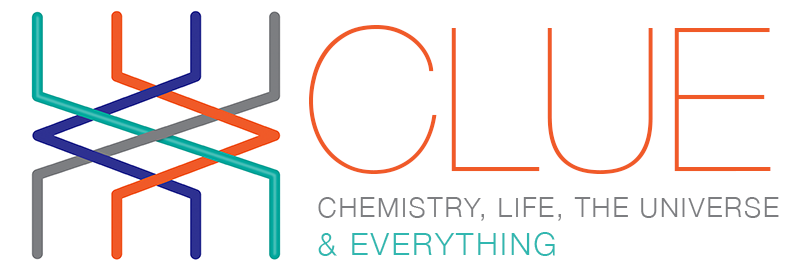What Is CLUE?
Chemistry, Life the Universe and Everything (CLUE) is a transformed general chemistry curriculum, developed by an interdisciplinary team of a chemist and a molecular biologist, that aims to bring about evidence based change in general chemistry. General Chemistry is a gateway course for many students intending on careers in scientific, engineering and health care related disciplines. While there have been many attempts to improve the outcomes for these students, little has changed over the past 60 years. Recent transformation efforts have focused primarily on incorporating student engagement techniques into the course, rather than considering what it is that is important for students to learn. CLUE is different. CLUE was developed using a design research approach that focuses on scaffolded progressions around four core ideas: structure and properties, bonding and interactions, energy, and change and stability. The course emphasizes causal mechanistic reasoning in order to help students move beyond knowing that, to knowing how and knowing why chemical phenomena occur.
The materials developed include a text (supplied free to students), lecture support materials, workshop/recitation activities, video mini-lectures, and formative and summative assessment materials. We have now taught the course for over five years, and this year all general chemistry students at Michigan State University took the CLUE curriculum. We have assessed the outcomes of CLUE in a number of different ways and find that in general course grades are higher than similar traditional sections, and ACS examination scores are similar. However, when we assess specific skills such as understanding how intermolecular forces operate, or the ability to determine and predict structure-property relationships, we find that CLUE students are significantly better at these tasks than a matched cohort of students from traditional sections. Perhaps even more importantly, these improvements are maintained throughout a year of (conventional) organic chemistry instruction.
About the Authors
Melanie Cooper
Dr. Melanie Cooper leads a team of chemistry education researchers at Michigan State University, where she is a professor of Chemistry, Lappan-Phillips Professor of Teacher Education, and a member of the CREATE for STEM Institute. | Cooper Research Group
Mike Klymkowsky
Dr. Michael Klymkowsky is a professor in the Department of Molecular, Cellular, and Developmental Biology at the University of Colorado-Boulder. His research interests include curriculum design, teacher preparation, and biology education, in addition to "traditional" molecular and cell biology. | Klymkowsky Research Group
